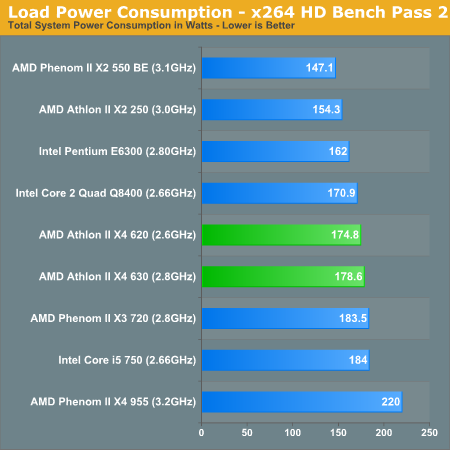AMD Athlon II X4 620 & 630: The First $99 Quad Core CPU
by Anand Lal Shimpi on September 16, 2009 12:00 AM EST- Posted in
- CPUs
Power Consumption

Without power gating the Athlon II X4 draws as little power as possible, noticeably less than any of AMD's other multi-core CPUs. Our X4 620 sample was a bit more power hungry than our 630.

Even under load the power consumption story is a good one. Given the position of our Q8400 sample here we'd say that the Q8200 would probably use a bit less power, but the price differential should more than make up for it.
Overclocking
As I mentioned at the start of this article I managed to hit 3.25GHz on the Athlon II X4 620 without any additional voltage using the retail AMD cooler:

I could hit 260MHz x 13.0 for 3.38GHz by upping the voltage, but the gain wasn't worth the additional power usage. Anything higher wasn't possible without more exotic cooling or much more voltage. The performance improved handily at 3.25GHz:
| Processor | Adobe Photoshop CS4 | x264 2nd pass | Left 4 Dead |
| AMD Athlon II X4 620 (2.6GHz) | 27.5 seconds | 15.4 fps | 93.2 fps |
| AMD Athlon II X4 620 @ 3.25GHz | 23.2 seconds | 18.9 fps | 102.9 fps |
| AMD Phenom II X4 955 (3.2GHz) | 22.3 seconds | 19.1 fps | 121.4 fps |
| Intel Core 2 Quad Q8400 | 21.8 seconds | 17.9 fps | 105.6 fps |
At 3.25GHz the Athlon II X4 ends up faster than the even more expensive Q8400in some cases, and gets much closer in others. In applications where the large L3 cache isn't missed, the overclocked Athlon II can end up being a poor man's Phenom II X4 955. But looking at the Left 4 Dead performance, there's no such thing as a free lunch - the overclocked Athlon II isn't quite that good.










150 Comments
View All Comments
fitten - Wednesday, September 16, 2009 - link
Your definition of "overclocked" is flawed. Back under the bridge with you!philosofa - Wednesday, September 16, 2009 - link
Can someone please ban this moron, and the others (who ironically I assume are on AMD's payroll?). Their lack of an understanding of the most basic logic is making me feel ill.Good Review though, just really want Bulldozer to come out!
james jwb - Thursday, September 17, 2009 - link
why can't people like you understand what is meant? I can handle my own CPU, so for me, i want to know which one is better clock for clock, and then see what the average each overclock to, then i'll jump in and buy one.The way data is currently being presented here isn't right, we need both ways (stock results with turbo on, and clock for clock style stuff for us overclockers).
Get it now? Probably not.
bupkus - Wednesday, September 16, 2009 - link
"Their lack of an understanding of the most basic logic is making me feel ill."Take a Tums; we're not interested.
rennya - Wednesday, September 16, 2009 - link
Overclocking is not the same as turbo mode.Overclocking voids your warranty, whether you use Intel or AMD CPUs.
Turbo mode doesn't void warranty because it is a valid feature.
SlyNine - Wednesday, September 16, 2009 - link
lol You will make your own little universe in your mind. okay lol.Overclocking. Lets see. Over, meaning above normal. Well since the post turbo mode clock is perfectly normal. Its not OVER clocking.
vol7ron - Wednesday, September 16, 2009 - link
Just because the clock rate is variable, does not mean it's [over/under]clocking. It just means the speeds change. In fact, even when you are running at stock speeds, the clock rate will vary - that is why you see 3.541 3.500 3.489To complain it's not a fair comparison, he's kind of right, but not for the right reason. It's as if he's in AMDs defense, rather than their scrutiny. Instead of comparing peaches-to-peaches, now you're comparing nectarines-to-peaches and there's two ways to look as this glass: Intel is turbo-ing during fewer threads, or Intel is decelerating in multithreaded situations; both have the same effect. (They're either trying to give you more bang for the buck, or they put out a bad product that only works half the time)
The end result, though, AMD doesn't do this on the fly. Sure you could test it at different clock speeds, but you could also overclock the i7 to something faster (and you might be back at square one).
Chlorus - Wednesday, September 16, 2009 - link
"remember that the lynnfield core i7 750 has turbo overclocking enabled so is overclocked to 3.2 ghz, which is 600 mhz overclocking, while amd processors are running at stock speedIs unfair to present the results this way, turbo is overclocking. "
Its not overclocking if ITS ON BY DEFAULT, you worthless troll.
hanhan1982923 - Wednesday, April 14, 2010 - link
22222222222222Thomas369 - Saturday, July 28, 2018 - link
The Athlon architecture also used the EV6 bus licensed from DEC as its main system bus. Intel required licensing to use the GTL+ bus used by its Slot 1 Pentium II and later processors. By licensing the EV6 bus used by the Alpha line of processors from DEC, AMD was able to develop its own chipsets and motherboards, and avoid being dependent on licensing from its direct competitor. https://chasebanklogin.us/chase-credit-card-login/